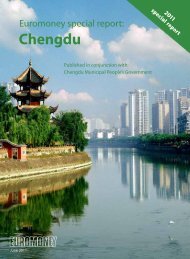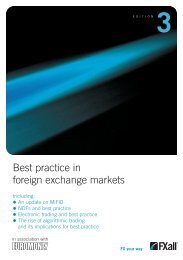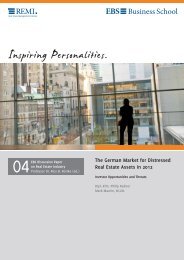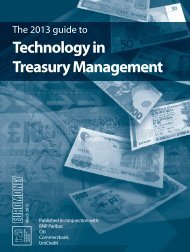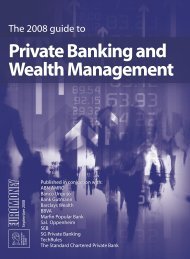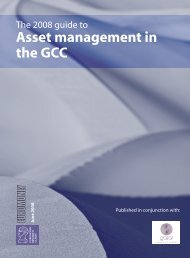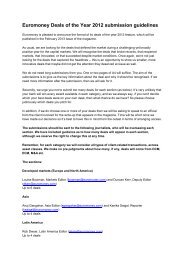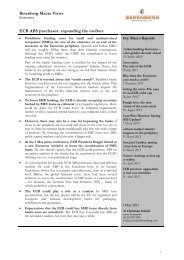Corporate Governance in the GCC - Euromoney
Corporate Governance in the GCC - Euromoney
Corporate Governance in the GCC - Euromoney
- No tags were found...
You also want an ePaper? Increase the reach of your titles
YUMPU automatically turns print PDFs into web optimized ePapers that Google loves.
Corruption perception <strong>in</strong>dex, world Arab countries 200302468UKUSAUAEOmanJapanQatarIraqYemenLebanonSaudi ArabiaKuwaitJordanBahra<strong>in</strong>10SwitzerlandIceland12Less corruptCountry rankMore corruptSource: Arab Human Development Report, 2004“The thought process that many Middle Eastern companies are now go<strong>in</strong>gthrough is really no different to what happened <strong>in</strong> <strong>the</strong> western corporatesector a decade or so ago”than Afghanistan and Mali. The UAE’s overall score of 4.3, meanwhile,is a higher average than those posted by Switzerland or Greece, but isnot helped by a disclosure <strong>in</strong>dex score of 4 – below Djibouti, Iran andBotswana.In many ways, bankers say that <strong>the</strong>se <strong>in</strong>dications are disappo<strong>in</strong>t<strong>in</strong>g, especiallyas some Middle Eastern countries have already demonstratedthat it is possible to develop very high standards of corporate governanceaga<strong>in</strong>st <strong>the</strong> odds. V<strong>in</strong>k says that Lebanon has already established aprecedent for outstand<strong>in</strong>g corporate governance standards that o<strong>the</strong>rcountries <strong>in</strong> <strong>the</strong> Middle East would be well advised to replicate.Never<strong>the</strong>less, bankers also recognise that <strong>the</strong>re are a number of goodreasons why corporate governance standards <strong>in</strong> <strong>the</strong> Middle East <strong>in</strong>general – and <strong>in</strong> <strong>the</strong> <strong>GCC</strong> <strong>in</strong> particular – are not as high as <strong>the</strong>y are <strong>in</strong><strong>the</strong> US or western Europe. Foremost among <strong>the</strong>se is <strong>the</strong> structure ofmany of <strong>the</strong> largest companies <strong>in</strong> <strong>the</strong> region, which have historicallybeen built up as family-owned organisations operat<strong>in</strong>g <strong>in</strong> a relativelysmall regional market that have s<strong>in</strong>ce expanded <strong>in</strong>to large-scale conglomerates,some of which are now global players. “One of <strong>the</strong> reasonswhy <strong>the</strong> Middle East is still a babe <strong>in</strong> arms with respect to corporategovernance is that up until very recently most of <strong>the</strong> region’s bus<strong>in</strong>esswas transacted on a regional basis,” says V<strong>in</strong>k. “Trade, money andpeople tended to circulate with<strong>in</strong> <strong>the</strong> region, but <strong>the</strong>re is only a certa<strong>in</strong>amount of bus<strong>in</strong>ess that can be done on that basis, and corporates<strong>in</strong> <strong>the</strong> Middle East are <strong>in</strong>creas<strong>in</strong>gly look<strong>in</strong>g to expand <strong>the</strong>ir horizonsbeyond <strong>the</strong> region.” Although many of those companies may have<strong>the</strong>ir roots <strong>in</strong> family-owned bus<strong>in</strong>esses, says V<strong>in</strong>k, a large cross-sectionare now major global players. “In <strong>the</strong> western world when we talk aboutfamily-owned companies we tend to th<strong>in</strong>k of organisations like fa<strong>the</strong>rand-sonplumb<strong>in</strong>g bus<strong>in</strong>esses. In <strong>the</strong> Middle East, a family-ownedbus<strong>in</strong>ess can be a multi-billion dollar conglomerate.”Today, says V<strong>in</strong>k, attitudes towards corporate governance among thosecompanies is chang<strong>in</strong>g, but he adds that external observers should notbe surprised if <strong>the</strong> process of change takes time. “The thought processthat many Middle Eastern companies are now go<strong>in</strong>g through is reallyno different to what happened <strong>in</strong> <strong>the</strong> western corporate sector a decadeor so ago,” says V<strong>in</strong>k.Certa<strong>in</strong>ly, an <strong>in</strong>creas<strong>in</strong>g number of <strong>the</strong> region’s lead<strong>in</strong>g quoted companieshave been announc<strong>in</strong>g a series of <strong>in</strong>itiatives on corporate governancethat sound encourag<strong>in</strong>g and progressive. Take <strong>the</strong> example ofEmaar, <strong>the</strong> real estate giant that is comfortably <strong>the</strong> largest companylisted on <strong>the</strong> Dubai F<strong>in</strong>ancial Market (DFM), account<strong>in</strong>g for about 18.6%of <strong>the</strong> DFM’s market capitalisation. As DFM’s most liquid stock, Emaar isalso popular with foreign <strong>in</strong>vestors as a proxy for <strong>the</strong> region’s boom<strong>in</strong>greal estate market, which makes <strong>the</strong> observance of <strong>in</strong>ternational-stylecorporate governance practices especially important. Hence <strong>the</strong> company’sannouncement <strong>in</strong> November 2005 that it had set up a <strong>Corporate</strong><strong>Governance</strong> Advisory Council, expla<strong>in</strong><strong>in</strong>g that “this pioneer<strong>in</strong>g <strong>in</strong>itiativeaims to develop <strong>in</strong>ternational benchmarks for corporate governancepolicies, rules and practices…that will be a beacon to progressivecorporations and <strong>in</strong>stitutions <strong>in</strong> <strong>the</strong> region.”



